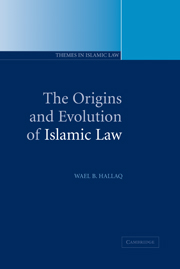Book contents
- Frontmatter
- Contents
- Maps
- Map 1 Arabia ca. 622 ad
- Map 2 Muslims lands in the third/ninth century
- Introduction
- 1 The pre-Islamic Near East, Muḥammad and Quranic law
- 2 The emergence of an Islamic legal ethic
- 3 The early judges, legal specialists and the search for religious authority
- 4 The judiciary coming of age
- 5 Prophetic authority and the modification of legal reasoning
- 6 Legal theory expounded
- 7 The formation of legal schools
- 8 Law and politics: caliphs, judges and jurists
- Conclusion
- Glossary of key terms
- Short biographies
- Bibliography
- Suggested further reading
- Index
3 - The early judges, legal specialists and the search for religious authority
Published online by Cambridge University Press: 05 June 2012
- Frontmatter
- Contents
- Maps
- Map 1 Arabia ca. 622 ad
- Map 2 Muslims lands in the third/ninth century
- Introduction
- 1 The pre-Islamic Near East, Muḥammad and Quranic law
- 2 The emergence of an Islamic legal ethic
- 3 The early judges, legal specialists and the search for religious authority
- 4 The judiciary coming of age
- 5 Prophetic authority and the modification of legal reasoning
- 6 Legal theory expounded
- 7 The formation of legal schools
- 8 Law and politics: caliphs, judges and jurists
- Conclusion
- Glossary of key terms
- Short biographies
- Bibliography
- Suggested further reading
- Index
Summary
THE EARLY JUDGES
In the previous chapter, we saw that the proto-qāḍī's office was not limited to resolving legal disputes and that it involved other activities related to tribal arbitration, financial administration, story-telling and policing. These were normative functions in qāḍīs' appointments down to the 80s/700s and even 90s/710s. Whatever change this office subsequently underwent was by no means sudden. From the ninth decade of the Hijra, the qāḍī's office increasingly was limited to conflict resolution and legal administration. From this point on, some qāḍīs were appointed qua qāḍīs, with no explicit stipulation of other duties that they should undertake. In fact, the distinctness of these duties and functions was made obvious by the nature of appointments. Thus, when ʿAbd al-Raḥmān al-Jayshānī was dismissed from his function as judge of Egypt sometime during the 130s/750s, he was immediately reappointed there as a tax-collector. The expansion and growing complexity of state functions appear to have required a narrowing down of the duties assigned to officials. However, these appointments seem to have been relatively few in number and for a few decades thereafter many judges continued to combine this office with other functions.
The centralization of Umayyad legal administration appears to have begun during the last years of the first century h, a policy that marked a change in the nature of judicial appointments.
- Type
- Chapter
- Information
- The Origins and Evolution of Islamic Law , pp. 57 - 78Publisher: Cambridge University PressPrint publication year: 2004



